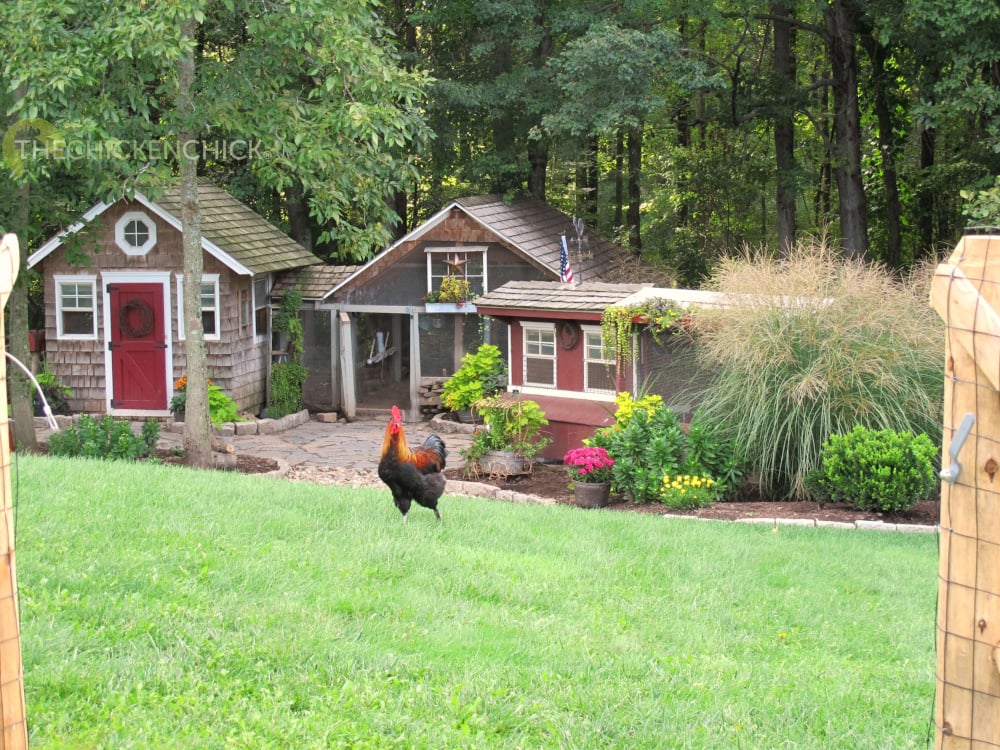Raising chickens can be a perfect part of your hobby farm or homestead, but how do you get started? Here are a few top tips from The Chicken Chick® Kathy Shea Mormino.
If you’re interested in establishing a hobby farm or homestead on your rural land, chances are raising chickens is at the top of your must-learn list.
In fact, thanks to the slow-food and self-reliance movements (not to mention the ghastly price of pasture-raised eggs), chicken keeping has become popular in all types of outdoors spaces―from rooftop urban settings to suburban backyards.

Photo courtesy of Stacey Coleman Photography
Learning How to Raise Chickens
If you’ve done any research on this topic, you’ve likely come across The Chicken Chick® Kathy Shea Mormino.
Kathy’s blog, The-Chicken-Chick.com, her social media presence and her books have made her one of the most trusted resources for backyard chicken keepers, homesteaders and hobby farmers.
An attorney by trade, a self-described accidental photographer, backyard chicken keeper and beekeeper, Kathy offers practical advice for novices and experienced chicken keepers about how to keep happy, healthy chickens.
In today’s article, Kathy shares the 10 things you need to know (and do) before purchasing your first flock.
If you’re in the research phase of chicken keeping or just got your first flock and feel you may have bitten off more than you can chew, this article is for you.
#1: Be Sure You Are Properly Zoned
“Before you start thinking about breeds, coop style or numbers, you need to make sure you are properly zoned to keep chickens,” says Kathy, referring to regulations about what you can do on your land. Zoning laws are determined by the city, town or county municipality that governs land uses in your area.
While it may seem like a no-brainer that it would be allowed for rural properties, zoning laws can be gray (at best) so it still pays to do your due diligence, especially if you live near neighborhoods, businesses or a school.
“Just because the law doesn’t say you can’t keep chickens doesn’t necessarily mean that you can. So check with a zoning official to answer your questions before you invest in a flock,” Kathy recommends.
If zoning prohibits raising poultry in your area, Kathy encourages aspiring chicken keepers to petition their local governments to change laws. It can be done, and there’s no harm in trying.
#2: Know Why You Want to Keep Chickens
Less than 100 years ago, nearly everyone kept laying hens out of necessity. But these days, people’s reasons for raising chickens have changed, and your reason will help you determine which breeds to choose, how many birds you need and coop size.
“Ask yourself, do you want to sell the eggs? Do you want eggs just for your family? How many eggs per week do you want or need? Is this more of a hobby? Do you want the chickens as pets? Do you want meat birds? Do you want a rooster―and does your zoning allow for one?”
#3: Think About the Time Investment
While chickens aren’t as high-maintenance as other animals, they do require daily care and monitoring.
“On a daily basis you have to check on them in the morning and make sure their drinkers and feeders are full,” Kathy says. “Eggs will need to be collected daily, the birds will always need to be secured at night, and then the rest is really about how meticulous you are about keeping their environment clean. So, the time commitment can vary widely.
“It’s also important to have trusted chicken-sitters available for when you’re out of town or on vacation. If you travel a lot this is not the pet for you.”
#4: Know What Types of Birds Will Suit Your Needs
Now that you’re clear on what you’re zoned for and what you expect from your chickens, it’s time to decide on breeds.
While there are numerous breeds to choose from, it’s important to keep your “why” in mind, as different birds have different temperaments, climate tolerances and laying capacities.
“Different breeds of laying hens have different laying rates,” Kathy says. “Some can lay eggs six days a week, but most do not. Numerous factors beyond breed such as stress, age, time of year and diet also influence egg production, so keep your expectations realistic.”
Kathy recommends Tractor Supply stores or local feed stores for chicks. You can learn more about which breeds may be right for you on The Chicken Chick® blog.
#5: Decide on the Coop
Now the fun part: the coop!
The design, size and quality of your coop is one of the most important factors in your success raising healthy, happy birds.
Per Kathy, if you choose the wrong coop you could be faced with behavioral problems such as feather picking or egg eating, loss to predators and general frustration with what was supposed to be an enjoyable endeavor.
While it may be tempting to save time by investing in a trendy, premade coop, Kathy recommends proceeding with caution: “The cheap comes out expensive. I have yet to see a chicken coop sold commercially that meets all my specifications for a highly-functioning, healthy environment for chickens. Most pre-fab coops today are built with Chinese Fir, which is very flimsy, doesn’t last and is not predator-proof. They’re a recipe for disappointment.”
As you decide on coop design, you will also want to consider your chickens’ “lifestyle” and the risk factors that go with it.
For example, chickens who free-range all day are at greater risk for being lost to predators than those that are confined primarily to a fenced-in area. Chickens that spend most of their days confined to a limited space are at greater risk for behavior problems borne of boredom, obesity due to less exercise, and foot pad infections from walking on their own waste all day.
There are pros and cons to each management style; you have to find what works for you.
So, what exactly is a “high functioning” coop? Kathy recommends the following basics for a safe, secure and comfortable coop:
- Build the coop before the chickens arrive. “Chicks grow incredibly quickly and getting a coop set up takes time, so be sure to get started with your coop plans well before your first flock arrives.”
- Select coop location carefully. The right location for your coop will be limited by the characteristics of your property, but you should take your climate into consideration. If it rains a lot where you live, be sure to site your coop at the top of any hill, not the bottom where flooding and runoff could be problems. If you live in a very hot climate, place the coop in a shady spot. If your area has frigid winters, try to find a natural windbreak for the coop.
- “Double the size you think you need,” says Kathy. “If your chickens are spending most of their time inside the coop, then 4 square feet per-chicken is the bare minimum space requirement. If they’re spending most of their time outdoors, less than 4 square feet inside the coop will be fine.” For outdoor space, or what’s known as the chicken run (a fenced, outdoor activity area), allocate a minimum of 10 square feet per-bird. Even chickens that free-range outside that area will require confinement in the most severe weather conditions.
- Elevation. Kathy recommends elevating the coop 1-2 feet from the ground to prevent wood rot in the coop floor. To maximize outdoor living space, underneath the coop can also provide a cool, shady spot for chickens in hot weather.
- Security. While your chicken’s lifestyle will help you determine the number of safety measures you will need to put in place, Kathy warns that chicken wire alone will not protect chickens from predators, and recommends using hardware cloth, also known as welded wire, secured with screws and washers, to cover all openings greater than an inch or two where a raccoon, weasel or other chicken-loving beasts could enter the coop.
- You will also need to consider the number of windows for lighting, ventilation for healthy airflow, nest boxes for egg-laying, roosts for sleeping on and more.
For a detailed list on coop essentials, check out Kathy’s article “The Chicken Coop Design Essentials, Details & Luxuries”.
If building your own coop sounds intimidating, Kathy recommends the following: “You can modify a premade shed, find building instructions on my blog or hire someone to do it. I’m also in the process of designing my own Chicken Chick® brand coops, which will be available for purchase!”
#6: Feeding Your Birds
While this should be the easy part, Kathy believes backyard chicken keepers are complicating it.
“This is the biggest place I think backyard chicken keepers are falling down. Poultry nutrition is an intensely studied science, and the poultry nutritionists who formulate chicken feed go to great lengths to ensure birds get all the nutrients they need in their chicken feed every day in every bite to be optimally productive and healthy.
“When you give your chickens dietary supplements or treats of any kind, including healthy dietary extras, whether it’s mealworms or kitchen scraps, you are diluting the complete nutrition in their chicken feed. It’s the equivalent of adding water to breastmilk and feeding it to your infant. If you feed your hens too many dietary extras, they will not produce eggs optimally, they will not be as healthy as they could be and they will not live as long as they could.”
Kathy says treats should be limited to no more than 2 tablespoons per-bird per-day -- and don’t offer them every day. Moderation with treats is the key to healthy chickens.
She also recommends giving chickens pellets or crumbled feed as opposed to whole grain, “granola-looking,” feeds. “While the whole grain feeds may look appetizing to us, the truth is the hens will pick out the biggest, brightest colored pieces first, leaving much of the essential nutrients behind,” causing them to become malnourished.
#7: Have a Space Prepared For Your Chicks
If you plan to buy chicks, you will need a brooder to house them and keep them warm in until they are big enough to regulate their own body temperatures and live in the coop. A brooder can consist of an extra-large cardboard box, a plastic child’s swimming pool, or even a canvas puppy playpen. The chicks need:
- A safe source of warmth such as a radiant chick warmer, which is readily available online and at many feed stores
- A bag of chick starter feed
- A water dispenser and
- An absorbent litter for the floor, such as pine shavings
#8: Have A Space Ready For Sick Or Injured Chickens
Sick or injured chickens will need to be separated from the flock for their own safety, so you need to be sure to have a safe place for them to recover. Per Kathy, a large crate or rabbit hutch in a garage or basement can work well for this purpose.
#9: Have A Veterinarian Lined Up For Chicken Emergencies
“Access to qualified medical care providers is a major problem for chicken keepers because most veterinarians don’t treat poultry. It’s a very specific niche and most poultry vets work for the commercial poultry industry, not in backyards or veterinarians’ offices.
“That said, it pays to call ahead to canvas local veterinarians to ask whether they will treat a sick or injured chicken. Don’t wait for an emergency to occur before making these calls as time is not likely to be on your side during a crisis. Ask to speak to the managing veterinarian directly because their front office staff may not know if a vet in the practice would be willing to see your bird.”
Click here for a list of avian veterinarians by state.
#10: Learn Some Basic Chicken First-Aid
Because most vets don’t treat chickens, it’s a good idea to have a little chicken first-aid knowledge under your belt.
While it’s not fun to think about, it’s also important to get educated about euthanizing chickens. “There will be times when the only thing between extreme suffering and a peaceful end for your pet chicken is your fortitude. Every chicken keeper should know how to euthanize a chicken humanely themselves.”
For a detailed list of what Kathy recommends keeping on-hand for emergency situations, read our article, How to build your chicken first aid kit and sick bay.
Time to Hatch Your Chicken-Keeping Plans!
There is a lot to consider when deciding if keeping chickens is right for you, but the rewards and satisfaction of raising your own flock are well worth the effort.
With what you’ve learned in this article today, and with the resources available on Kathy’s blog and in her book, The Chicken Chick’s Guide to Backyard Chickens: Simple Steps for Healthy, Happy Hens, you have everything you need to get started raising your own chickens.

























